Google now notices if your website as a whole shows topical authority.
So, guess what?
- It’s no longer good enough to have the BEST article on any topic.
- It’s no longer okay to focus 100% on bottom-of-funnel content.
- It’s no longer sensible to build an SEO strategy that doesn’t understand topical authority.]
Google’s SEO Starter Guide even states that:
“A site with a good reputation is trustworthy. Cultivate a reputation for expertise and trustworthiness in a specific area.”
To explore this concept I interviewed Jacob Clarke, from the NerdWallet organic growth team, on the How the F*ck SEO podcast.
He defines topical authority as “covering a topic across enough pages and with enough depth that it will allow search engines to view your website as the go-to site on a given topic.”
In this article, expect to learn:
- Why you should prioritize topical authority
- Two methods of measuring topical authority
- How to build topical authority (step-by-step)
- 5 topical authority case studies
Let’s get to it! 🚀
Why Is Topical Authority Important?
One reason SEOs love topical authority is that it can help websites overcome a weaker backlink profile.
Typically, websites with a strong backlink profile (a large number of high-quality backlinks leading back to the website) do better in Google rankings.
This means despite a broad niche targeting strategy, websites (like Forbes or Cosmopolitan) with high backlink authority can easily win most keywords.
We’re increasingly seeing now that websites can gain an advantage over sites like Forbes by niching down. By building tons of content in one niche, they can dominate it and become an "authority" on that topic.
We see this a lot with niche blogs. For example, in my interview with Retro Dodo we saw that the site ranks for more than 31,000 keywords containing “pokemon”. And now outranks sites like Buzzfeed despite their superior domain authority.

While there are 100s of different Google ranking factors that might add up to this, RetroDodo has over 1M monthly visitors despite what most would call a low backlink domain rating of 47.
We also saw that Living Cozy ranks for:
- 8,200 keywords containing the word “sofa”
- across 73 pages with 'sofa' in the URL
The site shows that competitive topic clusters are not 5-10 articles, they tackle EVERY keyword on that topic.
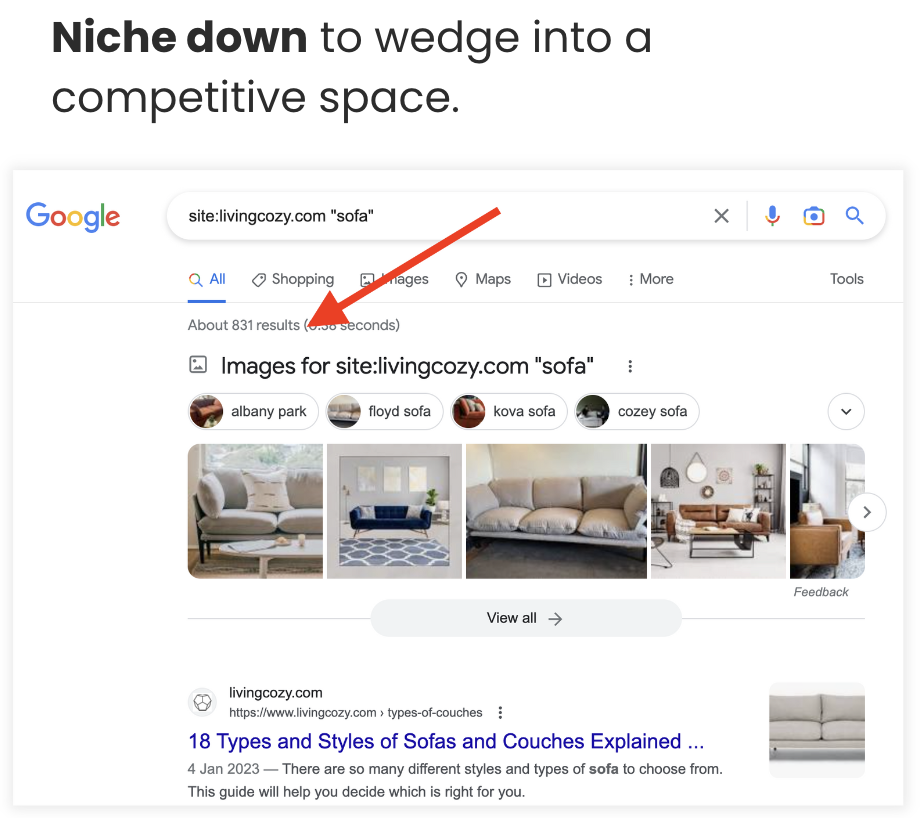
Topical authority may be the critical difference between ranking positions in the results.
How To Measure Topical Authority - 2 Methods
Now that you’re aware of how emphasizing topical authority can help your rankings, let’s dig into how you can check how much topical authority your website has on a certain subject.
The two most common methods for measuring topical authority are:
- Using SEO tools (Ahrefs, Semrush, etc.)
- Using spreadsheets, the old-school way
In theory, you gain an advantage by having more topical authority than other websites.
Measurement Method 1: Using SEO tools
Some SEO tools can determine the ‘traffic share’ or ‘topic share’ a website has for a certain topic.
Kevin Indig explained this simple logic in his article on topical authority: the more keywords related to a specific topic a site ranks for, the more topical authority it has on that topic.
Here’s how to check traffic or topic share for a specific topic on Ahrefs:
1/ In their Keywords Explorer, type in the main keyword - the broadest keyword - of a topic you’re interested in. In this example, I used customer support.
2/ On the left-hand side, choose Matching terms, then filter by keywords that have a search volume greater than 10.
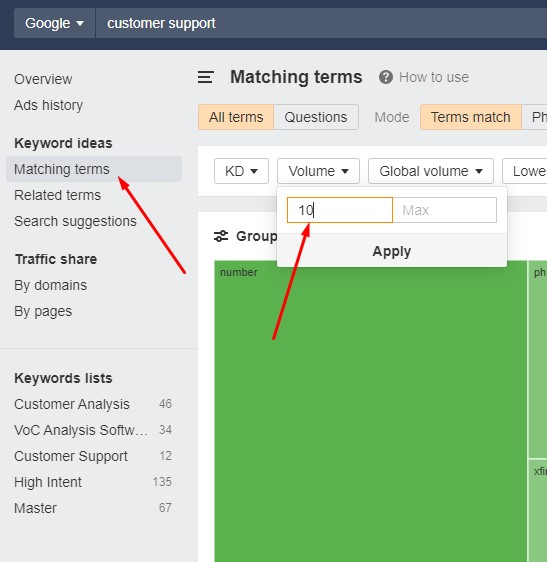
3/ Again on the left-hand side, under Traffic share, click on By domains. This gives you a list of all websites that collect organic traffic from this topic, ranked according to their traffic share.
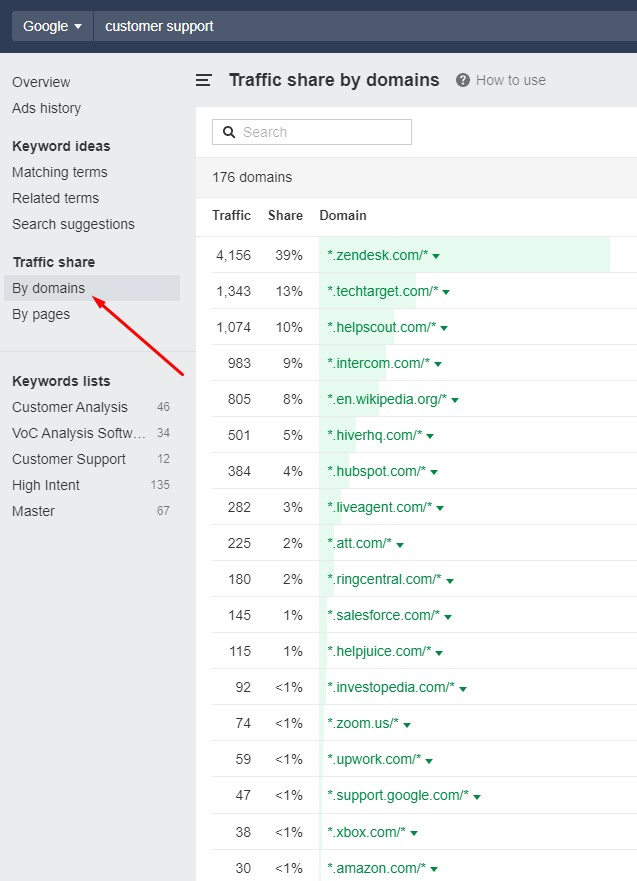
There is a search option you can use to find your website if it’s on the list.
Measurement Method 2: Old-school way (approximation; requires a bit of math)
If you’re not a fan of SEO tools or would just like a quicker approximation of topic authority, you can use the following method. For this one, you will only need a calculator and Google.
1/ Find the estimated number of pages from the website that are indexed on Google. Do this by typing site: https://www.yourwebsite.com/ into Google and checking the number of results for this search, like in the image below.

2/ Find the number of pages from your website that Google associates with a specific topic. Here, I wanted to check Backlinko’s authority on SaaS SEO.
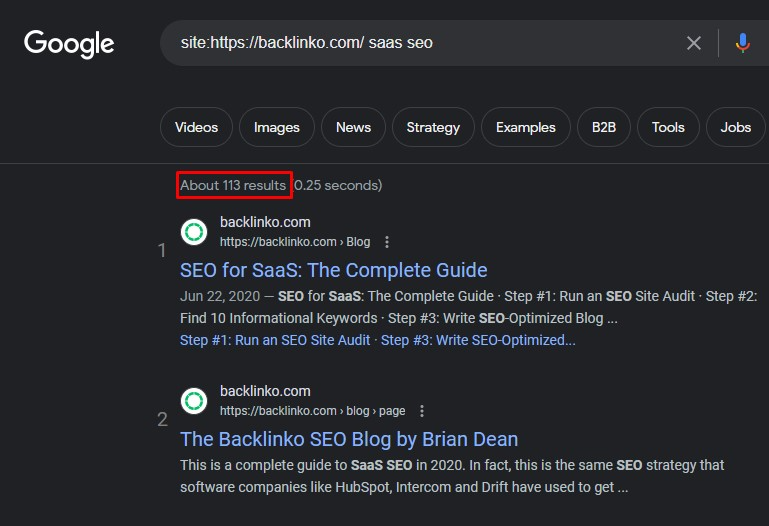
3/ Calculate the approximated topical authority of the website using the following formula:
(Number of pages associated with a topic / Number of total indexed pages) * 100 = Topical authority %
This is what it looks like in my example:
(113/488)*100 = 23.15%
For faster calculations, you can add this formula to a spreadsheet.
Keep in mind that his second method doesn’t take into account other websites that cover the same topic.
However, the higher the calculated percentage is, the higher the chances are that your website will quickly take the top spot in SERPs with any new pages on that topic.
How To Build Topical Authority in 4 Steps
So, how do you build topical authority? What’s the best way to gain topical authority FAST?
Before we dive in, here are the four steps we recommend:
- Cover the depth and breadth of a topic.
- Avoid keyword cannibalization like the plague.
- Add internal links that make sense.
- Don’t focus only on commercial, BOFU keywords (see step 1)
1. Cover the Depth And Breadth of a Topic
How many pages does a website need on a certain topic in order to have high topical authority? What is the magic number of articles for this to happen?
This is kind of an unknown. And your coverage of a topic depends on the topic itself. For broad, highly competitive keywords, you will need hundreds of pages to rank for 100% of the keywords available in that niche.
Both Jacob and I agree that this is difficult to quantify, but it’s not likely that your website will be considered an authority on anything with only 10, 20, or even 50 pages on one topic.
So, your first step is to map the entire opportunity of keywords in your space. Start from the broad, parent term of your topic. These can be keywords such as: content marketing, SEO, social media, dogs.
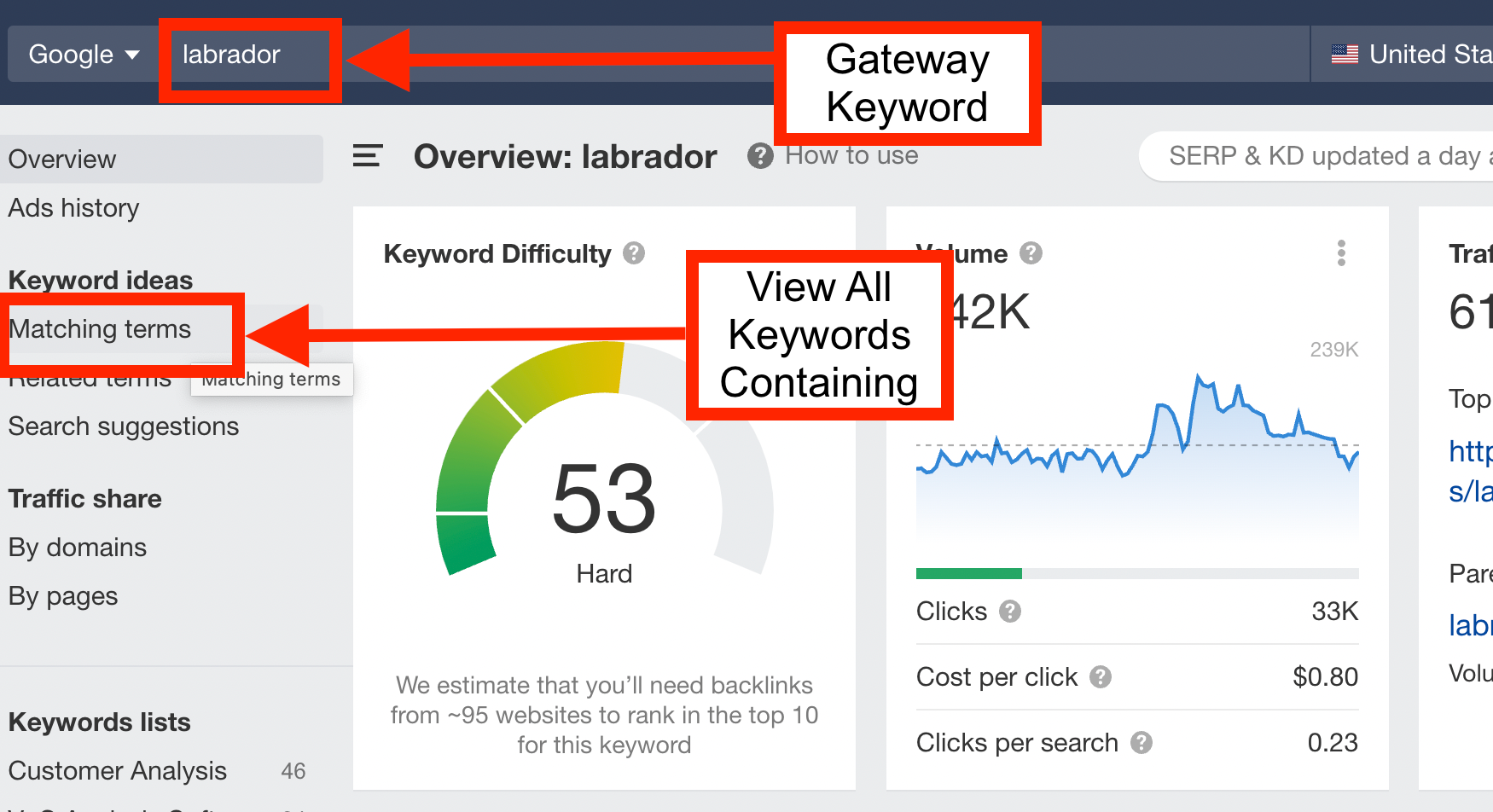
This is your category umbrella topic. A keyword is just a gateway to a topic, so within your umbrella, there are likely 20-100 subtopics you could cover.
Let’s take “dogs" for example.
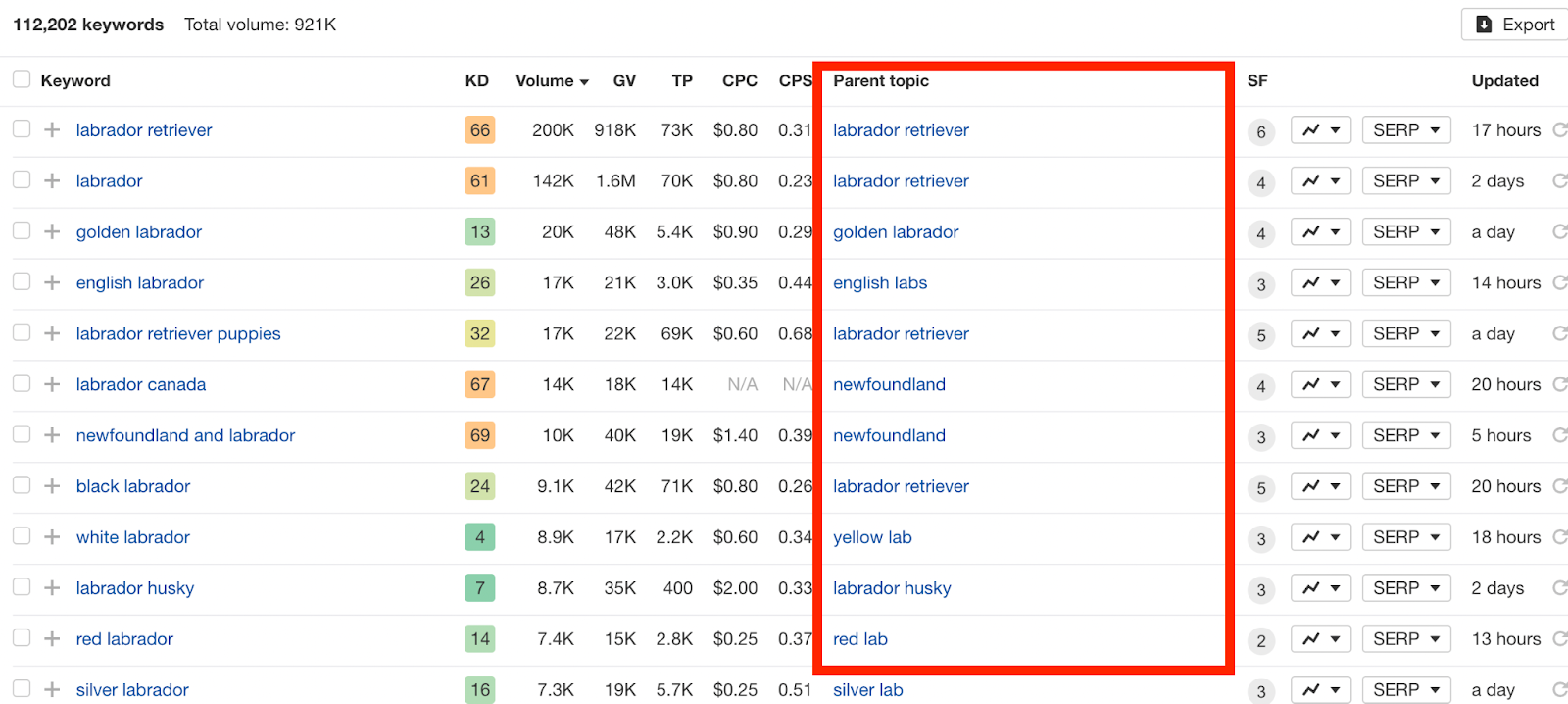
There are 100s of dog breeds and every single one has a subtopic dedicated to it. Each subtopic has 100s of keywords within it.
Just Labrador has 100,000+ related keywords.
You need to:
- Export all keywords on your topic
- Cluster them using a keyword cluster tool
- Create sub-topic clusters (I found Key Clusters recently and liked it)
- Prioritize the articles based on relevancy and opportunity
It goes without saying here, that not ALL keywords will be relevant to you and what you sell. Aim to align the keywords you research with topics your target audience is interested in.
I've mentioned topic clusters several times now. What do I mean by this?
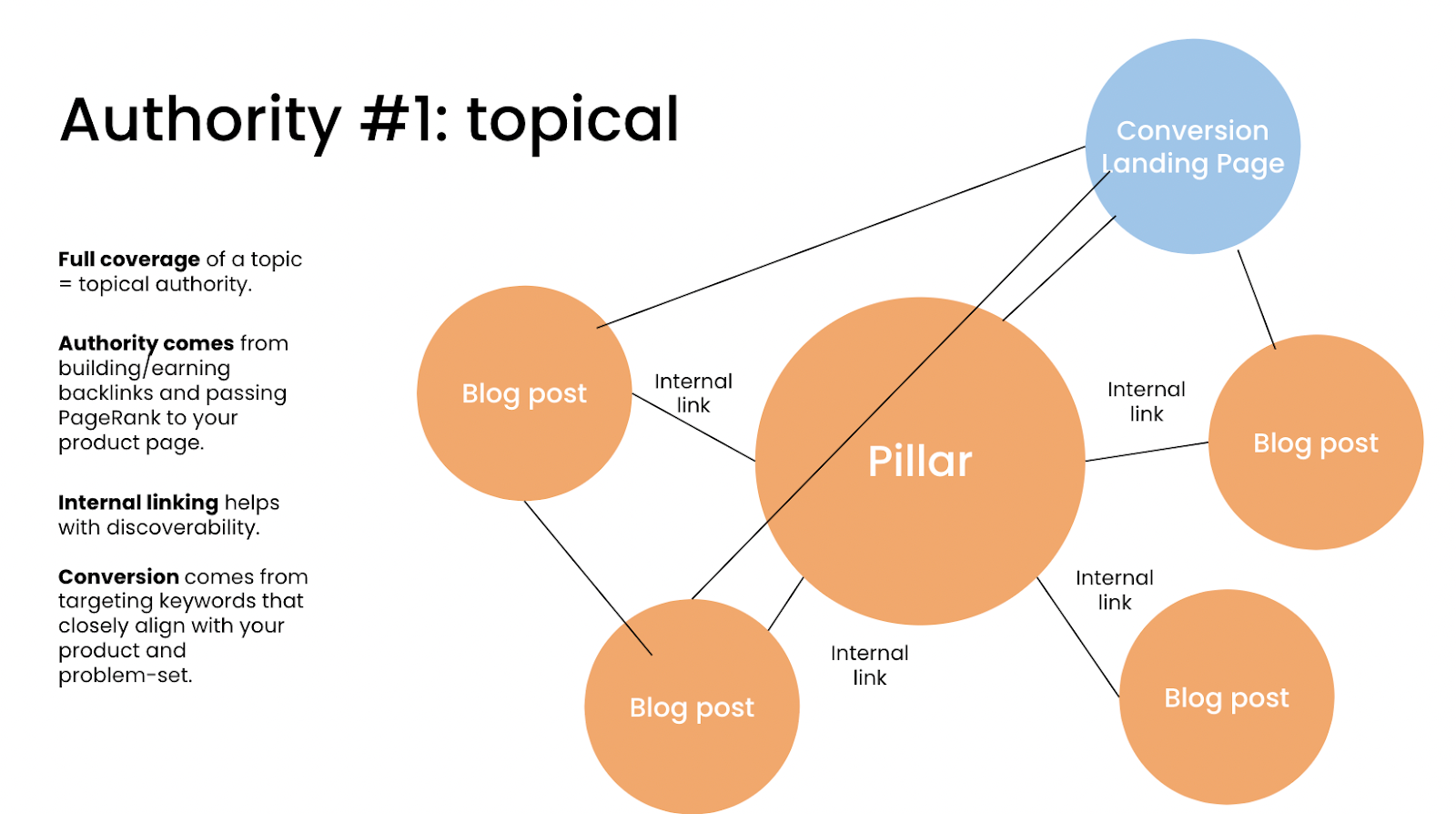
Topic clusters are groups of semantically related articles that all interlink with each other.
Try to break down your niche into subniches, and make those subniches the focus of your topic clusters.
By covering each sub-niche completely, you will gain more topical authority in the parent niche.
Topic cluster examples:
- This is the pillar page of a topic cluster on the topic of becoming an EU citizen. You can find more details about this topic cluster (and niche website) in our niche blogging SEO case study.
- Retro Dodo’s topic cluster on Pokemon
- This complete guide to project management by monday.com
- Maze's "UX Research Guide"
- Hotjar's "Net Promoter Guide"
“You’ll often see success by really going after one [topic] first. … That way, your site can start building topical authority one topic at a time.” - Jacob Clarke
2. Avoid Keyword Cannibalization
When choosing the right keywords to target for your topic, it is crucial that they don’t have overlapping SERPs.
What does this mean?
For example, let’s say that you want to target the keyword employee onboarding. You already have a page targeting employee onboarding process.
At first glance, these two keywords seem great to target for a website that wants to gain topical authority on the topic of HR.
Let’s take a look at the SERPs for each of these:
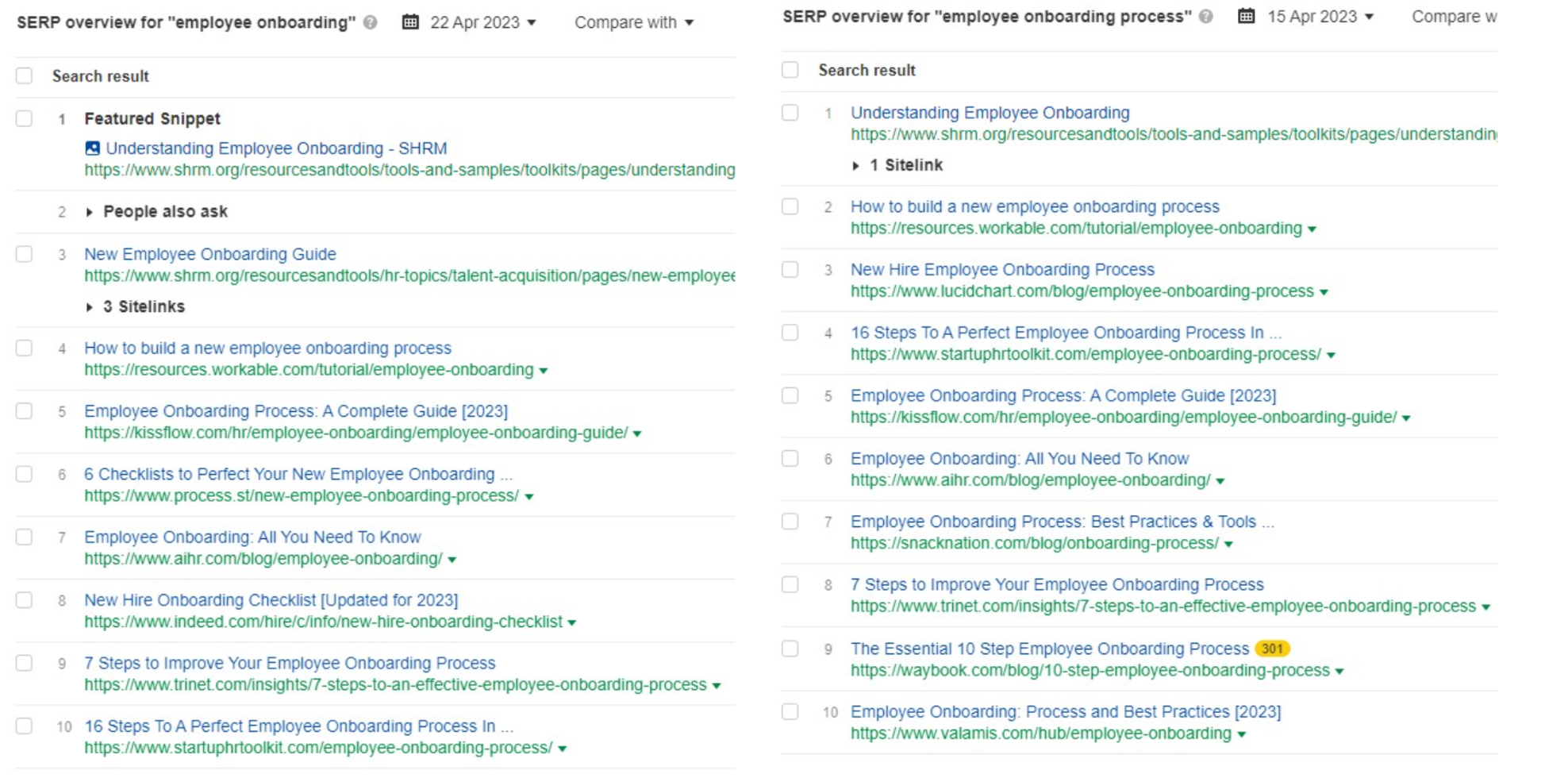
The SERP overlap (the number of shared results) is pretty high. For these two keywords, Google ranks the same 6 pages in the top 10 results.
For this website, it would be better to not create a new page targeting employee onboarding as, if optimized right, their employee onboarding process page can rank for that keyword as well.
The same is true the other way around.
“There’s also a lot of instances in which, intuitively, you might think that you could cover two different topics in a single page. But just based on the search results, Google actually sees them as separate topics and so you want to produce two pages.” - Jacob Clarke
In the last section, I mentioned keyword clustering. A good keyword clustering tool should help you avoid cannibalization by automating the process of SERP comparison.
3. Plan Out Your Internal Linking Strategy in Advance
If you’re creating a topic cluster, there is a golden internal linking rule you must follow:
Add internal links from every single cluster page to the core hub page. Internal links make clearer the relationship between pages and indicate to Google which pages are most important.
The more links, the more important a page. Therefore, you likely want more internal links to:
- A page that converts higher (high intent keywords / product pages)
- A page with high traffic volume (typically a parent topic "What is X?" page)
As your content library grows, it can become a burden to continuously add internal links from existing pages to new pages. Make a plan in advance to tackle this.
4. Build Topical Authority Across the Full Funnel
It’s a well-known notion in SEO and content marketing that 80% of a website's conversions come from just 20% of its pages.
This can lead to website owners and markets overly focusing on the 20% of keywords where they see the most conversions with (also known as BOFU keywords).
However, Jacob Clarke warns that this is a trap that’s all too easy to fall into.
“In order to rank for those really valuable queries, you also need a lot of informational content that establishes your site as an authority in that topic. [These are] the types of pages that aren’t necessarily going to drive the affiliate revenue or the email sign ups, but that help you create the topical authority that allows you to then rank for those keywords that do drive the money.” - Jacob Clarke
To win the keywords that drive real money, you now also need the pages that don't do all that much (apart from traffic).
Four Topical Authority Examples
To better understand the importance of topical authority and how to apply the concept to your website, here are four SEO case studies where topical authority played a big role in their organic success.
1. Monday.com wins project management
Monday.com is a project management tool that drives over 1.2M monthly organic visitors to its website.
They organize their content into industries (sub-niches), which allows for easier topic authority building.
For example, here is their project management hub:

With such a tactic, they were able to win the number 1 spot for the ultra-competitive keyword project management software and number 3 for the similarly competitive project management keyword.
2. RetroDodo dominates niche gaming
RetroDodo is a textbook example of how a website with a weak backlink profile (DR of 47) drives over 1M monthly clicks (and over $50K monthly revenue!) with high topical authority.
One of the keys to RetroDodo’s success is topic clusters. Here’s a visual breakdown of one that focused on the keyword retro handhelds:
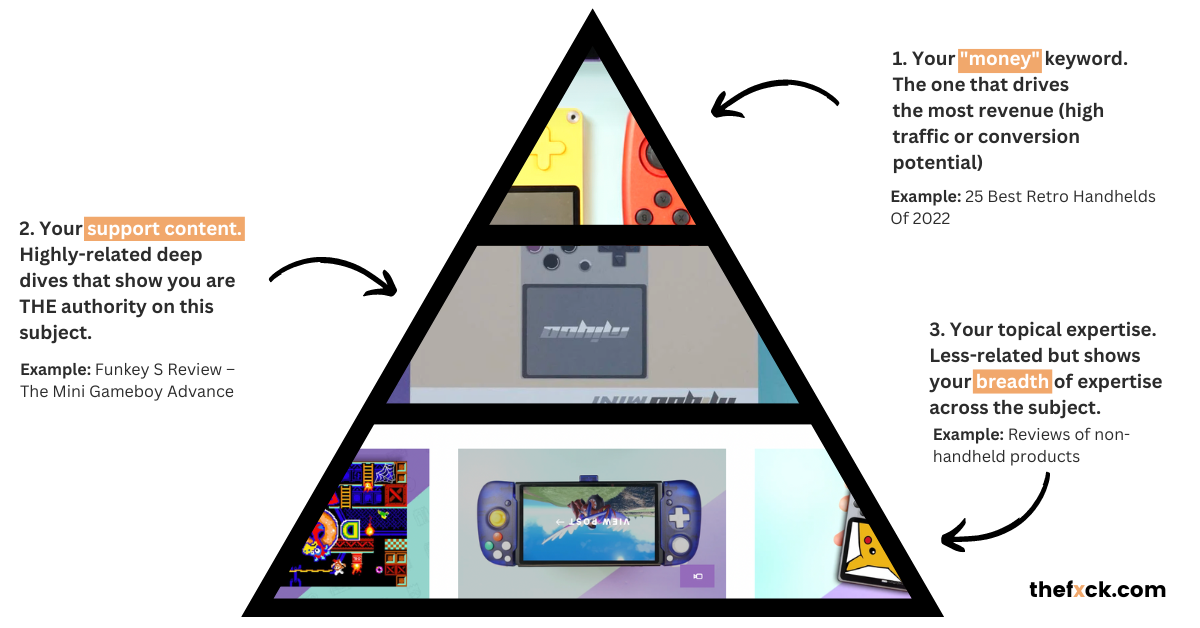
3. Typeform and its unshakable reign over survey-related keywords
Keywords related to surveys are highly competitive, not least because there are quite a few survey software tools gunning to rank high for them.
One of them is Typeform, which found its footing by creating pages with survey templates for hundreds of different use cases.
At the same time, they targeted more top-of-the-funnel keywords with topic clusters to solidify their topical authority in this niche.
4. How Respona implemented topic clusters
Respona’s content strategy relied heavily on the careful selection of which topics to cover, which keywords within those topics to write for, and building topic clusters.
With about 100 blog posts created, Respona went from 0 to 100,000 monthly visitors; its pages rank in positions 1-3 for most of its organic keywords.
Quick Topical Authority Q&A
What is topical relevance?
Topical relevance describes how relevant to a particular topic the content on a website is. Google (and other search engines) rely on topical relevance to determine how relevant a page is to the user’s search query. Topical relevance is determined by a number of factors, such as keywords, backlinks, content, and similar.
What is the difference between topical authority and domain authority?
Domain authority (also known as website authority) is the measure of a website’s backlink profile. The more high-quality backlinks a website has, the higher its domain authority.
Topical authority is the measure of a website’s authority on a certain topic (how wide and how deep the topic is covered on the website). The more well-written, in-depth articles on a certain topic a website has, the higher its topical authority.
What is semantic SEO?
Semantic SEO is based on creating content that is topically related instead of focusing on individual keywords that may not belong to the same topic.
Semantic content helps search engines return the most relevant search results, and it also helps websites cover a topic with more breadth and depth.
Ready to learn more about SEO? Check out our extensive library of case studies and how-to guides, all backed by leading SEO experts.


